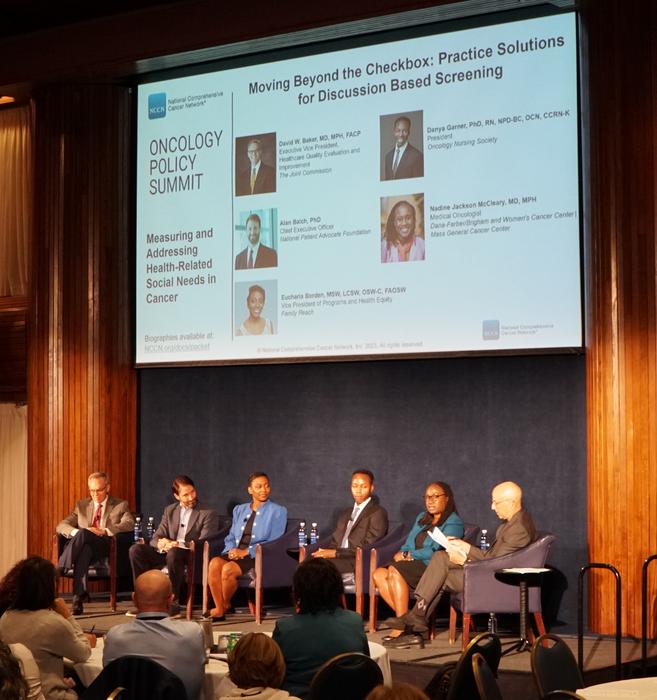Today, the National Comprehensive Cancer Network® (NCCN®)—an alliance of leading cancer centers—presented new recommendations for screening and addressing health-related social needs (HRSN) in people with cancer during a policy summit in Washington, D.C. The event included a keynote address from Ellen Lukens, Deputy Administrator and Director, The Center for Medicare and Medicaid Innovation (CMMI), and other speakers representing a diverse group of patient advocates, providers, and policymakers.
The new recommendations for measuring and addressing HRSNs were created by an NCCN working group chaired by Yelak Biru, MSc, President and Chief Executive Officer of the International Myeloma Foundation and Loretta Erhunmwunsee, M.D., Vice-Chair, NCCN DEI Directors Forum; Associate Professor, Division of Thoracic Surgery and Division of Health Equities at the City of Hope National Medical Center. The group proposed four core measurements to be assessed in all cancer patients at least once a year, plus at every care transition point, as a critical component of care.
The working group recommendations identified the following key areas for routine screening:
- Transportation Access
- Housing Security
- Access to Food
- Financial Security
The recommendations also include details on specific practice, policy, and guidelines approaches to make sure these needs are screened in a thoughtful, educated, empathetic, and culturally sensitive way, and then addressed in similar fashion. The different components were presented by Biru, along with Crystal S. Denlinger, M.D., FACP, Senior Vice President, Chief Scientific Officer for NCCN.
View the full HRSN recommendations from the NCCN working group at NCCN.org/social-needs.
“At NCCN, we know that caring for people with cancer must go beyond the clinic in order to achieve the best possible outcomes,” explained Dr. Denlinger. “Health-Related Social Needs (HRSN)—unmet economic and social conditions that affect an individual’s ability to maintain health and well-being—must be accounted for as a standard part of multidisciplinary health care. That means adjusting within a system that was not previously developed with these needs in mind. Our recommendations call for education, advocacy, and engagement so that patients, providers, and policymakers can understand why and how to measure and address health-related social needs.”
“We asked ourselves, ‘What practice, policy, and guideline recommendations will help close the HRSN-based care gap patients face?’” added Biru. “By implementing routine screening for HRSN, intentionally integrating it into practice, and advocating for policies to make that possible, we can personalize treatment plans, extend care beyond clinics, and drive policy reforms for equitable and patient-centered healthcare. We hope these actions can redefine cancer care, making it comprehensive, accessible, and just.”
The speakers acknowledged that unaddressed health-related social needs cause unnecessary suffering across every area of health. But they also pointed out that the complexity, longevity, high costs, and logistical concerns that are frequently associated with cancer care make this disease a particularly important focus for social needs screening.
“When someone gets a diagnosis of cancer, their life often gets turned upside down and simple things suddenly become difficult,” said David W. Baker, M.D., MPH, FACP, Executive VP, Editor-in-Chief, Joint Commission Journal on Quality and Patient Safety, The Joint Commission. “People with cancer may have trouble paying for care or may struggle to come in to see a doctor two or three times a week. If these health-related social needs are not addressed, they may not be able to adhere to treatment plans, meaning their health and even their life is threatened.”
“I’ve sat with families who, after a cancer diagnosis, tell me they are worried about being able to buy food,” said Eucharia Borden, MSW, LCSW, OSW-C, FAOSW, Vice President of Programs and Health Equity, Family Reach. “I’ve had patients ask me, ‘How can I afford to skip work to go to chemo?’ Treatment requires more than medicine. To truly improve health outcomes, we must ensure patients’ basic needs—food, housing, and transportation—are met first.”
The speakers reiterated that these questions should only be asked when there are also systems in place to follow-through with potential solutions. Without action, the panel members feared that screening could increase feelings of distress, shame, and mistrust. To prevent that, the working group advocated that any screening should be followed with connections to relevant community-based organizations working to address these needs. There must also be incentives put in place, such as reimbursement and accreditation, to make sure this happens consistently and systematically.
According to Darcie Green, Executive Director, Latinas Contra Cancer: “HRSN screening should enable patients to feel confident in their care and know that they will be supported. These recommendations must be applied in a patient-centered way that includes a greater investment in the resources needed to address any obstacles that prevent access to equitable care and outcomes.”
“Patient-centered care is the essence of oncology nursing,” agreed Danya Garner, Ph.D., RN, NPD-BC, OCN, CCRN-K, President, Oncology Nursing Society. “As one of the most trusted professions, nurses understand and promote the ethos of the whole person. Addressing the physical, emotional, psychological, and social needs of every patient is critical to survivorship. This is what oncology nurses provide to patients and their families every day.”
Rose Baez, MSN, MBA, Managing Director, Network Quality Innovation and Measurement, Blue Cross Blue Shield Association discussed some of the work being done by payers to address health disparities and called for national data standards to be developed and adopted in order to address social needs.
“We recommend Congress supports public-private partnerships to address social needs by leveraging the adoption of technology-driven solutions (e.g., clinical decision support) and community-based organizations that can improve outcomes for populations at risk of poor health outcomes, especially those experiencing barriers to care and services, and gaps in reducing health-related social needs,” said Baez.
Juny Simpson, Head of Health Equity, Customer Engagement, Genentech, also spoke to the importance of building partnerships to ensure all communities thrive.
She explained: “Our holistic approach involves partnering directly with organizations across the healthcare ecosystem—including industry, government and regulators, researchers, advocacy groups, community-based organizations, and people directly in the communities most harmed by systemic inequities in healthcare.”
Bláz Bush, MEd, Executive Director for LGBTQ+ Health Programs, Stanford Medicine, helped shed a light on how the LGBTQ+ community in particular can experience harm while trying to access health care.
“LGBTQ+ individuals who need to access cancer-related screenings and treatment may face critical disparities from lack of engagement with the healthcare system due to negative experiences and mistreatment,” said Bush. “Best practice recommendations to create an affirming environment for patients have existed for over a decade now; it’s time to implement them across the healthcare system. It is vital practices ask about sexual orientation, gender identity, name used, and pronouns; train employees on how to ask and use this information; create accessible, gender-inclusive options and healthcare rooming guidelines; and use inclusive imagery, educational materials, and signage.”
Overall, the speakers stressed the importance of listening to every patient without making assumptions. Implementing routine screening and standardized tools and best practices can help prevent unconscious bias from influencing care, ultimately reducing disparities in outcomes.
Alan Balch, Ph.D., Chief Executive Officer, National Patient Advocate Foundation; Nadine Jackson McCleary, M.D., MPH, Medical Oncologist, Dana-Farber Cancer Institute; and Robin Yabroff, Ph.D., MBA, Scientific Vice President of Health Services Research, American Cancer Society, rounded out the panels, which were moderated by healthcare consultant Clifford Goodman, Ph.D. NCCN CEO Robert W. Carlson, M.D., gave an opening address, and Dr. Denlinger returned to close out the program.
NCCN will return to Washington, D.C., on December 5, 2023 for the annual NCCN Patient Advocacy Summit. This year the focus will be on Navigating the Care Continuum from Screening through Survivorship. Learn more and register at NCCN.org/summits.
# # #
About the National Comprehensive Cancer Network
The National Comprehensive Cancer Network® (NCCN®) is a not-for-profit alliance of leading cancer centers devoted to patient care, research, and education. NCCN is dedicated to improving and facilitating quality, effective, equitable, and accessible cancer care so all patients can live better lives. The NCCN Clinical Practice Guidelines in Oncology (NCCN Guidelines®) provide transparent, evidence-based, expert consensus recommendations for cancer treatment, prevention, and supportive services; they are the recognized standard for clinical direction and policy in cancer management and the most thorough and frequently-updated clinical practice guidelines available in any area of medicine. The NCCN Guidelines for Patients® provide expert cancer treatment information to inform and empower patients and caregivers, through support from the NCCN Foundation®. NCCN also advances continuing education, global initiatives, policy, and research collaboration and publication in oncology. Visit NCCN.org for more information.












































